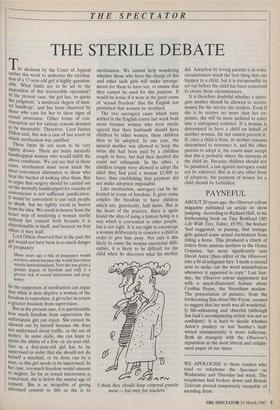THE SPECTATOR
THE STERILE DEBATE T
he decision by the Court of Appeal earlier this week to authorise the sterilisa- tion of a 17-year-old girl is highly question- able. What limits are to be set to the Imposition of this irreversible operation? In the present case, the girl has, to quote the judgment, 'a moderate degree of men- tal handicap', and has been observed by those who care for her to show signs of sexual awareness. Other forms of con- traception are for various reasons deemed to be unsuitable. Therefore, Lord Justice Dillon said, this was a case of last resort in which sterilisation was justified. . These limits do not seem to be very tightly drawn. There are many mentally handicapped women who would fulfill the above conditions. We can see that in these cases, sterilisation must seem much the most convenient alternative to those who bear the burden of looking after them. But to argue that surgery should be carried out on the mentally handicapped for reasons of convenience is not sufficient justification. It would be convenient to put such people to death, but we rightly recoil in horror from the idea. We recoil in horror from the lesser step of rendering a woman sterile without her consent both because it is objectionable in itself, and because we fear where it may lead. Lord Dillon observed that in the past the girl would not have been in so much danger of pregnancy:
Many years ago a risk of pregnancy would not have arisen because she would have been strictly institutionalised. Now she was given a greater degree of freedom and with it a greater risk of sexual intercourse and preg- nancy.
So the supporters of sterilisation can argue that while it does deprive a woman of the freedom to reproduce, it gives her in return a greater freedom from supervision.
But in the present case, it is questionable how much freedom from supervision the unfortunate girl can enjoy. She cannot be allowed out by herself because she does not understand about traffic, or the use of money. In some skills, she can hope to attain the ability of a five- or six-year-old. Just as a five-year-old girl has to be supervised in order that she should not do herself a mischief, or be done one by a man, so this girl needs to be supervised. In her case, too much freedom would amount to neglect. So far as sexual intercourse is concerned, she is below the mental age of consent. She is as incapable of giving informed consent to this as she is to sterilisation. We cannot help wondering whether those who have the charge of this and other such girls will make arrange- ments for them to have sex, or ensure that they cannot be used for this purpose. It would be ironic if it were in the great cause of 'sexual freedom' that the English law permitted that women be sterilised.
The two surrogacy cases which were settled in the English courts last week both arose because women who were sterile agreed that their husbands should have children by other women, these children then to be adopted. In one case, the natural mother was allowed to keep the twins she had been paid by a childless couple to have, but had then decided she could not relinquish. In the other, a childless couple were allowed to adopt the child they had paid a woman £5,000 to have, thus establishing that payment did not make adoption impossible.
Like sterilisation, surrogacy can be de- fended in terms of freedom. It gives some couples the freedom to have children which are, genetically, half theirs. But at the heart of the practice, there is again found the idea of using a human being in a way which is convenient to other people, but is not right. It is not right to encourage a woman deliberately to conceive a child in order to give him away. Not only is this likely to cause the woman emotional diffi- culties, it is likely to be difficult for the child when he discovers what his mother 'I think they should keep corporal punish- ment — but only for teachers.' did. Adoption by loving parents is in some circumstances much the best thing that can happen to a child, but it is irresponsible to set out before the child has been conceived to create those circumstances.
It is therefore doubtful whether a surro- gate mother should be allowed to receive money for the service she renders. Even if she is to receive no more than her ex- penses, she will be more inclined to enter into a surrogancy contract. If a woman is determined to have a child on behalf of another woman, the law cannot prevent it. If, once a child is born, its mother remains determined to renounce it, and the other parents to adopt it, the courts must accept that this is probably where the interests of the child lie. Because children should not be penalised, a law against surrogacy could not be enforced. But as in any other form of adoption, the payment of money for a child should be forbidden.


















































 Previous page
Previous page